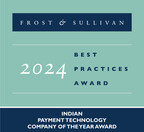SINGAPORE, Nov. 16, 2022 /PRNewswire/ — The deployment of satellite constellations in Low Earth Orbit (LEO) for low-latency and high throughput network applications and extending terrestrial network (TN) coverage have become significant drivers in the adoption of satellite services in the global telecommunications sector. According to global technology intelligence firm ABI Research, this adoption will culminate in US$141 billion worth of annual service revenues from satellites by 2030.

“Satellite communications services have seen a new wave of enthusiasm and convergence with terrestrial networks looking to extend past their zones of coverage and bridge the digital divide,” explains Andrew Cavalier, Satellite Communications Industry Analyst at ABI Research. Market developments have shown that satellite services like IoT, backhaul, commercial broadband, and Mobile Satellite Services (MSS) can meet carrier-grade performance requirements and enhance the telecom arsenal of any terrestrial CSP. With over 70 satellite service providers currently providing services worldwide, some of the most influential players in the growing satellite communications services space include OneWeb, SpaceX, Hughes Network Systems, and Globalstar.
There is an increased focus on deployments in LEO for key satellite services in broadband, backhaul, IoT, and MSS mobile applications. For the consumer segment, the competition over rural and remote market share will become a central battleground and one of the key drivers impacting the growth of these services over the next decade. For the enterprise segment, global supply chains are evolving in the aftermath of COVID-19 and conflict in Europe and are keen to build more resilient and efficient networks. To reflect these developments, ABI Research anticipates that these essential satellite services, in aggregate, will reach over 53 million subscribers by 2030.
“The market is evolving quickly, and many services are finding enhanced deployment through strategic alliances and increased bandwidth supply in LEO,” comments Jake Saunders, Vice President of Asia Pacific, and Research Director for ABI Research’s satellite communications service. Leaders are beginning to offer several solutions focusing on satellite-to-mobile device connectivity in partnership with telcos and smartphone manufacturers. Major partnerships include T-Mobile and SpaceX, Telstra and OneWeb, Vodafone and AST SpaceMobile, and Huawei and BeiDou.
“While these services are still in their early stages, there is evidence that they will find momentum as smartphone technology begins to peak, sales taper off, and new revenue streams grow in demand. To this end, the market is revealing new development paths that will influence the market and shape partnerships and opportunities for enterprises throughout the telecommunications value chain,” Saunders concludes.
These findings are from ABI Research’s SatCom Constellations: Deployments & Subscriptions market data report. This report is part of the company’s Satellite Communications research service, which includes research, data, and ABI Insights. Market Data spreadsheets are composed of deep data, market share analysis, and highly segmented, service-specific forecasts to provide detailed insight where opportunities lie.
About ABI Research
ABI Research is a global technology intelligence firm delivering actionable research and strategic guidance to technology leaders, innovators, and decision makers around the world. Our research focuses on the transformative technologies that are dramatically reshaping industries, economies, and workforces today.
ABI Research是一家国际科技情报公司,为全球科技领袖、创新人士和决策者提供实用的市场研究和战略性指导。我们密切关注一切为各行各业、全球经济和劳动市场带来颠覆性变革的创新与技术。
For more information about ABI Research’s services, contact us at +1.516.624.2500 in the Americas, +44.203.326.0140 in Europe, +65.6592.0290 in Asia-Pacific, or visit www.abiresearch.com.
Contact Info:
Global
Deborah Petrara
Tel: +1.516.624.2558
pr@abiresearch.com
SOURCE ABI Research

















